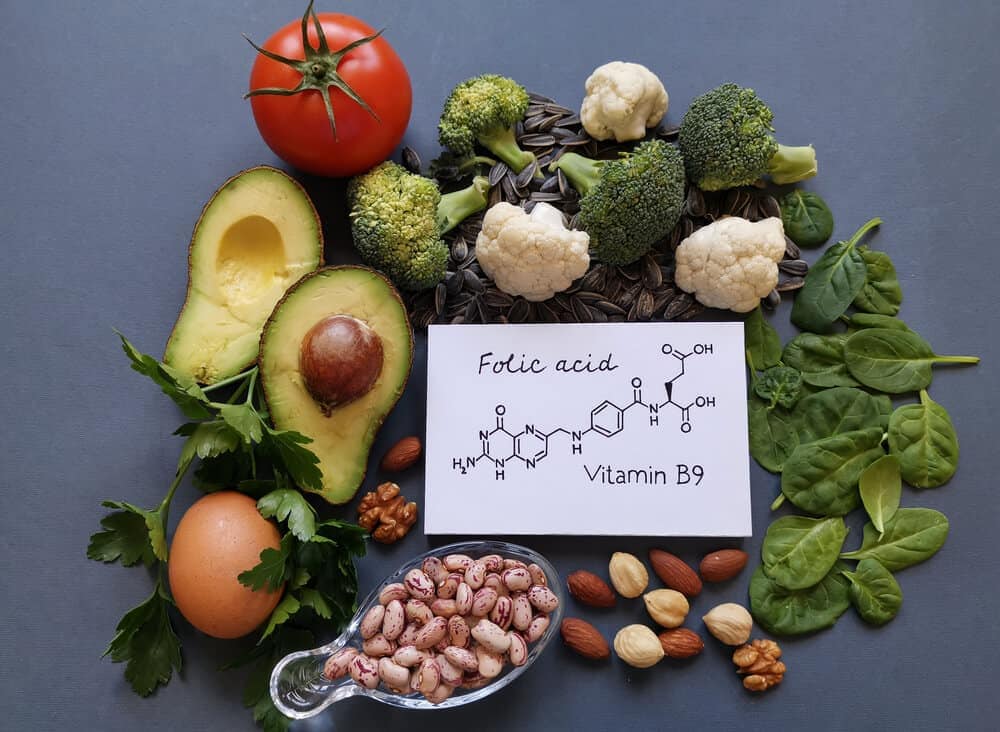What is Folic Acid?
The NHS define folic acid as the ‘man-made version of the vitamin folate’. Folate is also known as vitamin B9 and plays an important role in helping your body to make red blood cells which carry oxygen to all parts of your body. It is found in a variety of natural food sources, notably in leafy green vegetables and whole grains.
Why you should take folic acid if you are trying to conceive.
So, we know that folic acid is important to helping your body create red blood cells, but what does this have to do with conceiving and pregnancy?
Folic Acid is a B-group water-soluble vitamin. It is associated with the synthesis of DNA, RNA and proteins and with the process of cell division and chromosome repair. It helps the normal expansion of maternal tissues during pregnancy and helps prevent the increase in intrafollicular homocysteine, caused by a deficiency of folic acid, which results in the deterioration of oocyte quality. Scientific studies have also shown that a reduced intake of folic acid is often related to foetal growth defects and to the development of neural tube defects.
When should you start taking folic acid?
The NHS advise women to start taking folic acid daily when trying to conceive and in the first 12 weeks of pregnancy. This is because women require up to 10 times more folate during pregnancy in order for a baby to grow healthily. If a woman’s folic acid levels are healthy prior to getting pregnant, the risk of the baby developing neural tube defects is reduced by up to 70%. Spina bifida is the most common neural tube defect, a condition that affects the spine and is usually apparent at birth. While it isn’t very common, it is very dangerous for the baby.
How much folic acid should I take?
The easiest way to get the right amount of folic acid in your diet is through supplementation. The standard dose advised for women trying to conceive or during the first 12 weeks of pregnancy is 400mcg a day. Folic acid is a water-soluble vitamin so ‘overdose’ is not a risk if you are taking an additional conception vitamin tablet that contains folic acid.
Impryl is a conception supplement which contains the right dose of 400mcg a day, your Recommended Dietary Allowances (RDA) of Methylfolate, the active form of folic acid, as well as several other activated micronutrients. Impryl’s unique formula helps improve the quality of both sperm and egg cells and is one of the only fertility supplements which has clinical data to show it improves birth rates in sub-fertile men and women. It is recommended by fertility specialists across the UK and has helped countless couples to start or grow their families.
If you suffer from PCOS, you might be interested in taking Inofolic Alpha. Inofolic Alpha can be safely taken alongside Impryl as the two supplements work on different areas of fertility and will not interfere with each other. Although both products contain folate/folic acid, the combined folate dose is within normal guidelines. Many women take 800 mcg of folic acid per day: if you choose to take both Inofolic Alpha and Impryl you will receive this amount. Check with your GP for the appropriate daily amount of folic acid for you.
Start your journey with Inofolic Alpha, today
Are folic acid supplements for fertility safe?
Folic acid is considered ‘very safe’ by the NHS. It is extremely rare to reach a toxic level when eating folate from food sources. However, an upper limit for folic acid is set at 1,000 mcg daily because studies have shown that taking higher amounts can mask a vitamin B12 deficiency. Although safe, higher daily amounts than this should only be taken under medical supervision from your doctor. Some women are recommended to take higher doses such as if they have a raised BMI, a history of ‘neural tube’ defects, such as spina bifida in previous pregnancies, or are taking anti-epileptic medicines.
How can I add folic acid to my diet?
Folate (the active form of folic acid) is also found in small quantities in healthy foods. You can find folate naturally in:
- broccoli
- brussels sprouts
- leafy green vegetables, such as cabbage, kale, spring greens and spinach
- peas
- chickpeas and kidney beans
Fortified foods
Due to the health benefits associated with folic acid it is often “fortified” into certain foods. Most breakfast cereals will contain some folic acid in it and recently, in September 2021, the UK government announced that it will be adding it to wheat flour.
“Folic acid will be added to non-wholemeal wheat flour across the UK to help prevent life-threatening spinal conditions in babies, the government and devolved administrations have announced.
Adding folic acid will mean foods made with flour, such as bread, will actively help avoid around 200 neural tube defects each year – around 20% of the annual UK total.”
For more information about spina bifida visit https://www.nhs.uk/conditions/spina-bifida/ or https://www.shinecharity.org.uk/, providing specialist advice and support for spina bifida and hydrocephalus across England, Wales and Northern Ireland.








